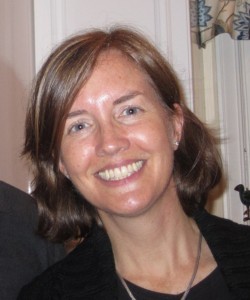 A guiding principle of working with people with brain injuries is helping them find “somewhere to live, someone to love and something to do.” UBC alumna Alison McLean, BSc (OT)’89, MSc’10, aspires to help her clients achieve all three during their recovery and rehabilitation. She has witnessed how it can be incredibly challenging to live a fulfilled life when one of those aspects is missing. McLean finds personal and professional meaning in working together with clients towards their goals and seeing them become involved in activities and roles important to them in their lives.
A guiding principle of working with people with brain injuries is helping them find “somewhere to live, someone to love and something to do.” UBC alumna Alison McLean, BSc (OT)’89, MSc’10, aspires to help her clients achieve all three during their recovery and rehabilitation. She has witnessed how it can be incredibly challenging to live a fulfilled life when one of those aspects is missing. McLean finds personal and professional meaning in working together with clients towards their goals and seeing them become involved in activities and roles important to them in their lives.
Back in high school, the description of the Occupational Therapy (OT) degree program in the UBC course calendar immediately peaked McLean’s interest. Her interest was confirmed through volunteer work with Sunny Hill Health Centre for Children, the Disabled Skiers Association of BC and at a summer camp for teens with disabilities. She felt pursuing a degree in OT at UBC was a good fit for her because it would allow her to contribute to individuals’ physical, social and psychological well-being. OT is the practice of enabling individuals to participate in the occupations of everyday life self-care, leisure and productivity.
After graduation, McLean found work in a brain injury rehabilitation program at the George Pearson Centre, and she continues to work in brain injury rehabilitation today. Currently with the Acquired Brain Injury Program’s Outreach Team at the GF Strong Rehab Centre, she works with individuals living in the community who may be a few months or many years post brain injury. She has also worked in medico-legal assessment with OT Consulting/Treatment Services Ltd. since 1995. McLean joined UBC’s clinical faculty in 2001 and began teaching clinical reasoning, evidence-based practice and neurological rehabilitation with a special focus on cognitive rehabilitation.
As a clinician and instructor, McLean found it necessary to keep up-to-date with clinical research evidence. After working as a clinician for nearly two decades, she felt it was time for a new challenge and direction in her career. She wanted to boost more than just her practical skills and knowledge—she wanted to bring something new to the table. Pursuing a Master of Science degree seemed like the perfect fit. It was never a question where she would go for her Master’s. With her life firmly rooted in Vancouver and a high regard for the OT program at UBC, her choice was simple—an MSc in Rehabilitation Sciences at UBC. Her thesis focused on exploring social participation and subjective well-being for individuals attending brain injury drop-in centres.
After graduate studies, McLean found her strongest interest lay with knowledge translation—taking new research evidence and integrating it into clinical practice. She has returned to full-time clinical practice, but has increased her involvement in research, teaching and knowledge translation projects. Currently, McLean is working with a research team at the GF Strong Rehab Centre examining the use of a number of cognitive assessments. As part of a Vancouver Coastal Health regional working group, she is also assisting clinicians to enhance best practice in the area of cognitive assessment and rehabilitation. Now a Clinical Assistant Professor, McLean continues to teach within the Department of Occupational Science and Occupational Therapy, and she has co-developed and co-instructed a two-day workshop for OTs in assessment and intervention of executive dysfunction.
McLean also spearheaded a project to develop a decision-making tool (clinical algorithm) to guide OTs in their clinical reasoning and decision-making during the process of cognitive assessment. Her goal was to develop a tool that could be used for both OT students and clinicians. Finalized in 2011, the algorithm has practical uses across client populations, from acute to long-term care. It has become the basis of an OT clinical practice guideline in Vancouver Coastal Health. The cognitive assessment algorithm has also been shared at conferences nationally and internationally. Bridging the gap between research and clinical evidence to create a tool that enhances clinical practice has enabled McLean to merge her passions in clinical work, teaching and research and give back to a profession that has given her so much over the years.
–Written by: Anne McCulloch
Comments are closed, but trackbacks and pingbacks are open.